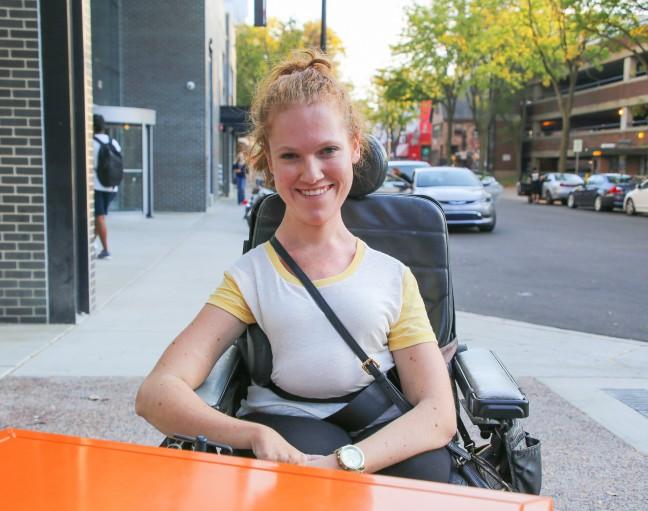Hayley Frieler said the way she succeeded on campus despite having muscular dystrophy was through self-advocacy.
“You need to advocate for yourself,” Frieler said. “It’s a lot of self-advocacy being on campus, but if you can do all of that, professors are pretty good. I had a really good experience here accessibility wise.”
Frieler, a recent University of Wisconsin graduate, originally wanted to attend college in New York to pursue a career in fashion and design.
Her parents thought it was too far, so after narrowing down her options to UW, Edgewood College, Northern Illinois University and DePaul University, Frieler chose to make Madison her home during her undergraduate years. With accessibility being a top priority in her decision, Frieler felt out universities through conversations with their disability centers.
“If you talk to anyone that knows me or meets me, they would say that I’m the one that can get it done,” Frieler said. “My sisters and I were not raised any differently growing up. We had the same set of expectations, which really helped.”
Frieler was not fond of a majority of her freshman year, because she said college was big transition. Going from having her mom as her primary caretaker to eight different students with rotating schedules, it was difficult to make sure her accommodations were always met.
In some instances, Frieler said she waited four or five hours for assistance with tasks because her personal care staff came at specific times during the day, meaning when they weren’t there, Frieler had to seek help elsewhere.
The university isn’t responsible for the provision of personal care, Frieler said. But she said UW did provide classroom aids for her, since being a textile and apparel design major has physical demands, such as the measuring and cutting of fabrics.
The McBurney Disability Resource Center, which strictly meets living and academic needs, helped re-equip her dorm with an automatic door and lowered light switches. Frieler said when she began to use the Include, Respect, I Self-Direct program, which helps adults with disabilities live independently, she was able to have more control in her caretaking while on campus.
“I’m the boss,” she said. “I think I’ve hired 30 people in the last four years. I hire, set their wages, do their scheduling and am in constant communication with them. It gives me complete control over my own care and that, in and of itself, is a huge independence thing for me that I really appreciate.”
She said the current state of campus accessibility is good, but accessibility in some of the older buildings could be better. For example, if a handicap door button didn’t work, she was the one that had to report it.
But from an academic standpoint, Frieler said professors understood. During the Madison winters, Frieler sometimes wouldn’t be able to go to class because the cold could potentially damage her chair, or the snow and ice was a potential threat to her health and safety.
Frieler said she doesn’t use her disability as an excuse, but in times like these or any others where accommodations were necessary, professors helped due to her ability to simply ask for help.
“You have to be proactive, you have to go talk to your professors and let them know what’s up,” Frieler said.


